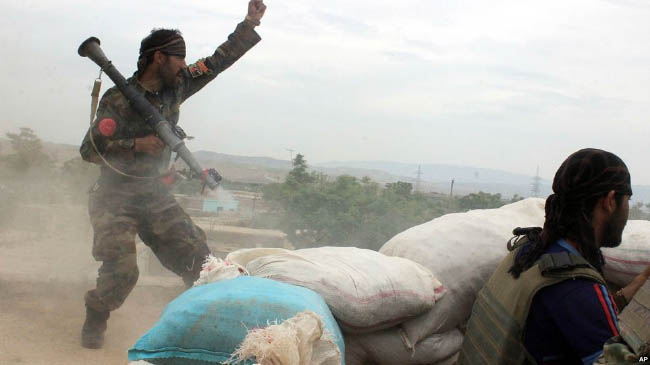Afghan nation has suffered painfully within present and past war and civil unrests. The regimes which menaced Afghans’ religious values, ethical code and cultural norms encountered public resistance and disintegrated. Secular movements, in the traditional society, were hampered by radical resistance. To protect the society from harms, the country was fragmented and streams of blood were spilt. The high sensitivity against secular movements redirected Afghanistan to radicalism which bred horror and terror.
The nation was unaware of the fact that radical mindsets would inflict greater damages on the society. For instance, Taliban’s emergence created less sensitivity among the public as it operated under the mask of religion and one could not predict the horrible consequence of its regime. Establishing their reign in the country, the Taliban crossed religion’s red line and trampled upon the rights and liberty of the nation in the worst possible way. This dictatorial regime, prolonged the war in Afghanistan and people still suffer from insurgency despite the regime’s downfall. Warring factions, which practice upon radical ideology, inflict casualties upon the nation without an iota of humanity.
Afghanistan’s war against the former Soviet was called “bleeding wound” by Mikhael Gorbachev. Dr. Najib, the chief of Hezb-e-Democratic Khalq, sought to heal the wound through national reconciliation and establishing a coalition state along with opposition faction. He said that it was for a decade that Afghanistan was burning amidst war and violence and some claimed to change the country into bloodbath and then they witnessed the very bloodbath. He added that they would have to protect Afghanistan. In a nutshell, war could do no more than adding insult to the injury.
It is believed that Afghan nation still suffers from the “bleeding wound” and pay heavy sacrifices for peace and prosperity. This time it is not the liberal or secular factions but our religious tenets are violated by the Islamic fundamental groups and our rights and liberty are trampled upon by radical groups such as the Taliban and the self-styled Islamic State of Iraq and the Levant (ISIL). It is believed that the radical ideology is as threatening to the society as the liberal ideology and both are to be fought. The war against former Soviet was fought under the slogan of threatening the Islamic Sharia and religious beliefs. However, the religious extremists are also a threat to our beliefs and culture. They have spread Islamophobia in Europe and harm our religion through inhuman and immoral practices. Now, the question is that how to heal this “bleeding wound” which has lingered up to date?
Afghan government also seeks to heal this bleeding wound through resuming reconciliation process with warring factions, mainly the Taliban which carry out the bulk of the operations and inflict heavy casualties upon combatants and non-combatants alike. Recently the government has signed peace agreement with Hezb-e-Islami Afghanistan (HIA) led by Gulbuddin Hekmatyar, who spearheaded many attacks against the former Soviet. However, the insurgency continues unabated since the Taliban led by Haibatullah Akhundzada refused to hold talks. It is said that the Taliban held secret informal talks with Afghan government in Qatar in September. However, there is little hope for the fruition of the talks as it took about a decade without a positive result. Despite this fact, the government intends to practice upon Dr. Najib’s mechanism for a peaceful and prosperous Afghanistan namely calling upon warring factions to lay their arms and join the peace process.
Contrary to Afghanistan’s persistence for negotiation of peace, the Taliban fighters have intensified their attacks and spill the blood of soldiers and civilians indiscriminately. In another term, the high graph of fatalities is a great cause for concern. US Army General John Nicholson said that Afghans suffered high casualties last year and it had been the same or higher this year. “One of the principle factors for the high casualties has been the leadership, the failures of leadership at certain levels. Primarily this has been in the police and to a lesser extent in the (Afghan) army,” he is cited as saying. According to him, “the failure is the ability to properly supply them and lead them.”
According to the public beliefs, there are many challenges within the government’s apparatus besides escalated militancy. For instance, there is a sense of mistrust among the high-ranking officials within the state. The trust issue may affect the soldiers’ morale adversely and let the Taliban elements to fish in troubled water. After all, it will be a blow to the leadership and aggravate the challenges. As a result, reports are replete with carnage, corruption, narcotic cultivation, unemployment and human rights violation. So, the country is involved in political syndrome and it is hard to heal this chronic “bleeding wound” which lingered for years. Resolving the within-state issues is the first step toward prosperity.
In addition to combating insurgency, the state should prevent from the spread of radical mentality which might be imposed on our culture through the Taliban’s sympathizers. The security is to be tightened on Afghan-Pak porous border and the seminaries’ text books and their activities will have to be supervised by the government. The “bleeding wound” may be healed if the officials build a strong sense of trust, abolish the hotbed of radical mindsets and continue the counter-insurgency with the aid of its allies and international community.
Home » Opinion » How to Heal the ‘Bleeding Wound’?
How to Heal the ‘Bleeding Wound’?
| Hujjatullah Zia

